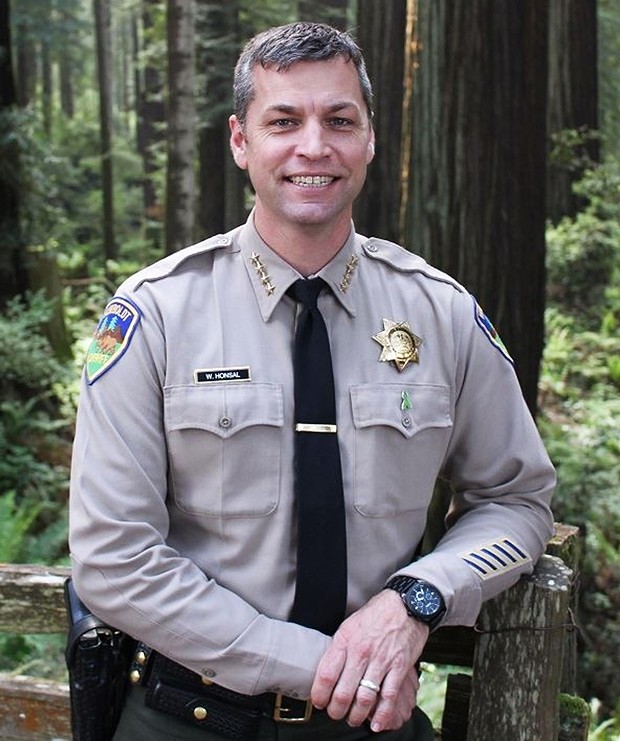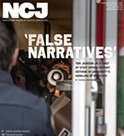Grand Jury Recommends Civilian Oversight of Sheriff's Office
By Thadeus Greenson [email protected] @ThadeusGreenson[
{
"name": "Top Stories Video Pair",
"insertPoint": "7",
"component": "17087298",
"parentWrapperClass": "fdn-ads-inline-content-block",
"requiredCountToDisplay": "1"
}
]
The Humboldt County Civil Grand Jury is calling on the county to implement a layered system of police oversight of the sheriff's office similar to a model being used in Eureka.
"The Humboldt County Civil Grand Jury recommends that the board of supervisors establish a civilian oversight board to review, report on and make recommendations in support of law enforcement and an office of the inspector general to provide an independent, professional assessment of critical incidents and advice regarding law enforcement best practices," the grand jury's report states. "A civilian oversight board enhances transparency and accountability and gives the community a voice."
The Board of Supervisors and the Sheriff's Office have until the end of June to officially respond to the report but, reached by the Journal, Humboldt County Sheriff William Honsal questioned the need for such a system.
"I'm an elected official," Honsal said. "If there's going to be oversight, then why aren't all elected officials subject to oversight? Are we singling out the sheriff's office for some particular reason? I don't see a specific reason that they're saying the system we have in place is not working. To create another government body to provide advisory-type decision making to the sheriff, is that really necessary?"
In its first report of the 2023-2024 term, the grand jury begins by stressing that "oversight is constructive, not punitive," arguing that it can strengthen professionalism within law enforcement agencies and give residents a "clearer view" of critical incidents and allegations of misconduct. Further, the report argues, civilian oversight of elected offices "promotes good management, fiscal responsibility, transparency and accountability."
As it stands currently, the report argues there is little accountability for the sheriff, noting that while it is an elected position, elections only come every four years and it's common for the incumbent to run unopposed. As such, the report charges that the most effective supervision of the sheriff's office is currently done through the Board of Supervisors' annual budget appropriations process.
"Although the Humboldt County sheriff is entrusted with enormous power, the accountability of the sheriff is mostly limited to these annual budget reviews," the report states.
Honsal pushes back on this assertion, noting that in addition to elections, voters have the ability to recall the sheriff if there's dissatisfaction in the community. Additionally, he notes the district attorney is the co-lead in the county's multi-agency Critical Incident Response Team protocol for critical incident investigations, adding a layer of oversight, while the Department of Justice can intercede if it feels a sheriff isn't following the law.
"They have the authority to essentially shut down the sheriff's office, criminally charge me or bring me to court," Honsal says, adding that the Humboldt County Human Rights Commission and the grand jury itself also exercise oversight roles locally.
But what the grand jury is recommending is a more direct and ongoing system of oversight for the sheriff's office, which has about 300 employees, fielded more than 48,000 calls for service in 2021 and has an annual operating budget of about $62 million, according to the report.
The grand jury recommends a two-prong system.
The first element is a civilian oversight board that would be "a cross section of county residents" appointed by and responsible to the county Board of Supervisors. The board would be given the power to subpoena documents from the sheriff's office, as well as witnesses, which the grand jury deems "an essential element if the public is to have trust and confidence in the oversight board." The board would have the authority to investigate and review policies and practices, make findings and recommendations. It would meet in public, with the sheriff or undersheriff required to attend.
The second prong of the system recommended by the grand jury would be an "inspector general" — either an individual or a qualified professional firm — appointed by the board of supervisors who would receive and review citizen complaints, investigate critical incidents and allegations of misconduct, monitor law enforcement operations through regular audits and investigations, and review internal investigations conducted by the sheriff's office. Additionally, the inspector general would analyze racial profiling data and trends, and make recommendations regarding law enforcement policies and practices.
The model is similar to one in place in the city of Eureka, which has a Community Oversight on Police Practices Board, with members appointed by the city council, and an independent police auditor, OIR Group, a southernCalifornia-based firm. Under its contract with the city, OIR Group is paid $90,000 annually to review the Eureka Police Department's internal affairs investigations and provide public feedback, review critical incidents and provide quarterly reports to the oversight board with feedback and recommendations. Under Eureka's model, neither the board nor OIR Group has subpoena power, though OIR Group has not publicly reported having had any issues getting access to requested documents or witnesses.
While the city's model does not have the legal authority of what the grand jury is recommending for the sheriff's office, there is no indication it has acted as a rubber stamp for EPD's investigations. At times, the auditor has disagreed with EPD's findings and determinations, and it regularly suggests changes to better put the department in line with best practices. In its latest quarterly report, for example, OIR Group recommends EPD change policies regarding critical incident investigations to require officers to give statements during the same shift in which the incident occurred and to prohibit officers from watching video footage of a critical incident prior to giving their statement.
Eureka Police Chief Brian Stephens says he believes the system has been good for both the department and the community overall. He says the oversight board provides a valuable conduit for getting information both to and from the community, fostering improved communication between the department and those it polices. And OIR Group, Stephens says, has been a good partner, bringing valuable expertise to the table that has helped the department improve its internal investigations, policies and procedures.
"I think it's been a positive relationship," Stephens says. "They have other clients and they've seen a lot of things."
Stephens says the system isn't perfect, noting that OIR Group's reports can sometimes make misconduct allegations seem worse than they are and that they sometimes can't publicly provide the level of detail needed to understand an incident due to officer privacy protections. But overall, he says he believes having the independent auditor has both helped improve EPD's inner workings and built public trust, pointing to a recent audit of responses to mental health-related calls for service in which OIR Group indicated it was "overall impressed" with EPD's performance.
"I'm happy with the model right now," Stephens says.
Honsal, meanwhile, is not happy with what the grand jury has recommended for his department. Saying he wanted to limit his comments until he officially responds to the recommendations, Honsal says he believes an oversight board would add an unnecessary layer of bureaucracy.
"I've tried to be very transparent in everything we do here and for them to say there needs to be another layer of transparency and accountability, it's like, 'Wow, show me what I'm doing wrong. Show me how I'm not building the public's trust and we can discuss that,'" he says.
Honsal also took issue with the grand jury's contention that recent critical incidents have put his department "in the spotlight," noting that two of the eight incidents cited in the report's appendix were police shootings by officers with other agencies.
While Honsal questions the need for an oversight board and inspector general, he says he does see some things he believes would improve the current system. He says he'd love to implement "some kind of disciplinary board" to review all his department's internal affairs investigations and make recommendations both as to what would constitute appropriate discipline in a case and investigative improvements.
Honsal must officially provide a written response to the grand jury's recommendations by July 1.
Thadeus Greenson (he/him) is the Journal's news editor. Reach him at (707) 442-1400, extension 321, or [email protected].
Comments (3)
Showing 1-3 of 3
more from the author
-
Grand Jury Blasts Eureka Schools' for Lack of Transparency, Due Diligence in Jacobs Deal
- Jun 12, 2024
-
No Safe Parking
Hailed as a success, Humboldt's only program comes to a close due to a lack of funding
- Jun 6, 2024
-
Eureka Schools Amends Property Exchange Agreement, Sets Escrow Deadline
- Jun 4, 2024
- More »
Latest in News
Readers also liked…
-
Through Mark Larson's Lens
A local photographer's favorite images of 2022 in Humboldt
- Jan 5, 2023
-
'To Celebrate Our Sovereignty'
Yurok Tribe to host gathering honoring 'ultimate river warrior' on the anniversary of the U.S. Supreme Court ruling that changed everything
- Jun 8, 2023
































